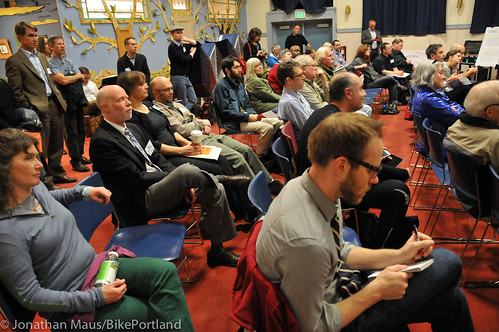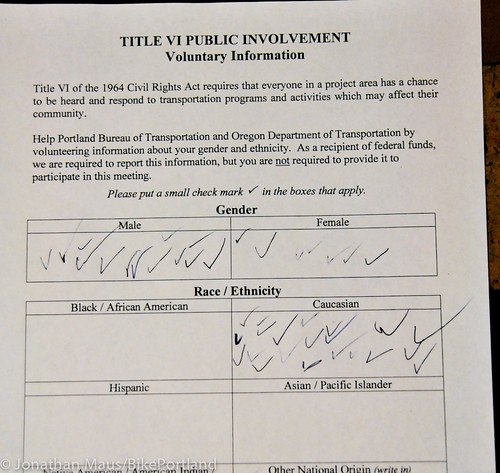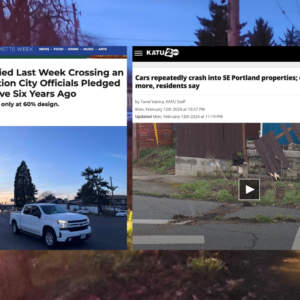
Last night was the coming out party for the City’s big new effort to raise new revenue for transportation. It was the first of three Town Hall events planned for this month where the Bureau of Transportation will make their funding pitch and ask for feedback from the public.
The night was anchored by a panel of Portland’s three most powerful transportation leaders: Mayor Charlie Hales, City Commissioner Steve Novick, and PBOT Director Leah Treat. Each of them shared a common sentiment throughout the night that echoed the “Our Streets” slogan being used to market the effort: If we want to solve the chronic shortfall in local transportation funding, we must step up to the plate and do it ourselves. Or put another way, it’s time for some new taxes to pay for our roads.
The event had a fairly typical feel for a PBOT public input session with a lot of top PBOT brass standing around rows of big posterboards full of stats and information about the agency’s various responsibilities — from pavement to bridges, sidewalks and signals. One thing I noticed was that some of the posters (pavement, signals, bridges) had a specific list of “Investment needs”, while other posters (protected bike lanes and sidewalks) had no such list. This could have been a simple oversight by PBOT, but I hope they remedy it before the next town hall because it makes it appear as though some things have more urgent funding needs than others.
Here’s a sampling of the posters…






Also in attendance was aggrieved mom-turned traffic safety activist Kristi Finney. Finney’s son Dustin was hit and killed by a drunk driver as he rode his bicycle on SE Division in August 2011. Finney now finds herself playing a role for PBOT similar to that of Susan Kubota, a woman who was thrust into the spotlight to help pitch former Mayor Sam Adams’ “Safe, Sound and Green” funding proposal. Like Finney, Kubota was an accidental activist who became passionate about traffic safety after her niece Tracey Sparling was killed while biking in October 2007.
After perusing posterboards, everyone was called into a large room to hear the pitch from Mayor Hales, Commissioner Novick, and Director Treat.
As the crowd took their seats, I scanned around to see who had showed up. It was a far lower turnout than I expected for inner southeast Portland. Take away the PBOT staff and assembled media, and there couldn’t have been more than two dozen citizens in the room. It was also a decidedly older crowd. As for gender and race, the city’s Title VI Public Involvement sign-in sheet (something they started bringing to public meetings during the Williams Ave project) showed about twice as many men as women and the crowd was almost entirely “Caucasian”.
Back to the speeches…
Hales started things off by assuring the crowd his administration is doing a good job “getting back to basics” and that they’ve made headway in re-paving streets with their fog seal program (which is far from real paving, but that’s for another day). But, he added, “We’re here tonight because we need to consider doing more to come up with additional revenue to make our streets safer and maintain them in good condition for years to come.” Hales lamented the fact that gas tax revenue from the state and federal government hasn’t kept up with inflation. Because of that, he said, “It falls to us to take care of our own house.”
Novick echoed Hales’ DIY vibe at the outset of his remarks with a direct and simple appeal: “Thank you for being here. We really need your help.” Novick specifically asked for help in prioritizing. Even with a new revenue source, he explained, the funding picture for PBOT is likely to remain very constrained. (A poster in the hallway showed how PBOT gets just a paltry 2% ($8.7 million) slice of the City’s total General Fund budget.) And those limited funds are “all spoken for,” he explained, because of past debt service to previous commitments like the Sellwood Bridge project.
Novick added that, “Even if Portlanders are willing to be generous” and tax themselves to pay for transportation, “It’s hard to imagine we’d have enough money to address all the things we’d like to address.”
Novick also spoke to the issue we’re sure to hear a lot about in the months to come: What’s the proper balance between investing in maintenance and updating street designs to save lives? “Streets are kind of like teeth,” he said, “if you don’t floss and brush every day you into root canals and extractions and it gets very expensive.” But on the other hand, Novick reminded the audience that 35 people died on Portland streets last year (twice the amount of homicides). As for specific safety remedies, Novick mentioned flashing beacons and sidewalks.
To put it another way, Novick used a Rolling Stones reference: “I don’t mean to be too depressing, but we need your help prioritizing… You can’t always get what you want, but if you try sometime, you just might find, you get what you need.”
PBOT Director Leah Treat was last to speak. After thanking the audience and the PBOT staff for their hard work, she ended her remarks by saying, “My highest priority is going back to the basics. Getting our roads into safe condition for all users, making them all passable, and increasing the safety for everyone that uses our road network.”
PBOT staffer Mark Lear then gave a presentation outlining what’s next in the process. At this point, PBOT hasn’t identified any specific projects to be funded with any new revenue, but that process — along with some specific ideas about how to raise the new funds — will be developed by late March and into April. After that, there will be more meetings and public open houses, then an official proposal will be ready for City Council adoption by early June.
This feels like a very short timetable. But perhaps that’s part of PBOT’s strategy? In general it seems they are taking a subdued approach to this entire effort. Hales, Novick and Treat didn’t make any inspirational calls to action last night. There was no passionate plea about how transformative new transportation revenue could be. There was no exciting vision of future grandeur put on the table to help ease the pain of asking people to open their wallets. Heck, so far the effort doesn’t even have a catchy name (besides “Our Streets” which is really just a URL and a Twitter hashtag). “[We] haven’t spent much time on naming,” says PBOT Communications Director Dylan Rivera.
Maybe the City is hoping that by keeping a low profile and not promising everything to everyone (like Adams was famous for doing) this effort won’t attract all the attention — both good and bad — that Adams’ did and it will just squeak onto the ballot and pass? Time will tell, but that feels like a gamble to me.
(NOTE: Unfortunately I had to leave prior to the Q & A session that followed Lear’s presentation. I heard it was quite spirited. Perhaps someone who was there could fill us in?)
— If you missed last night’s event, there are two more planned next week: Tuesday (2/27) from 6:30 to 8:30 at Immigrant & Refuge Community Organization (IRCO 10301 NE Glisan St.) and Thursday (2/27) at the same time at Multnomah Arts Center (7688 SW Capitol Highway). Learn more at OurStreetsPDX.com











Thanks for reading.
BikePortland has served this community with independent community journalism since 2005. We rely on subscriptions from readers like you to survive. Your financial support is vital in keeping this valuable resource alive and well.
Please subscribe today to strengthen and expand our work.
I would love to see the City get creative with ways to generate income for transportation from traffic enforcement,increasing revenues from parking, and high fees on large trucks and studded tires. This would have the added benefit of creating safer/longer-lived streets
The city can’t tax trucks and studded tires because vehicles are regulated by the state.
But you’re right about enforcing traffic laws and added parking revenue.
The City also couldn’t adjust speed limits but they successfully lobbied the legislature to change state law to allow them to do so.
I was there and raised the studded tire question (to significant applause from those present), but I asked if the tires could be banned, not taxed. I was told this issue was brought up internally, and they are pursuing whether it could be possible.
I think it was after you left, Jonathan, but after hearing Terry Parker and his friend give multiple comments about cyclists not paying, I stood up and pointed out that 1/2 or more of most of the streets we need to maintain are taken up by storage of private property in the form of cars.
I pointed out that Dr. Donald Shoup estimates the value/cost of these spaces is potentially equal to or greater than the rest of the roads themselves.
Considering that parking is named as a major revenue source already, it seems to me that smarter metered parking is a no brainer. We do need less contractor overhead, longer enforcement hours, smarter electronic enforcement,and performance and progressive pricing )rather than ticketing for going over an arbitrary limit).
The city also needs to work to develop more options for neighborhoods to create permit districts of various types and with various fee and funding structures. Our main streets and commuter/business district overflows could support a lot of their own maintenance w/o taxing residents.
These comments were well received by the crowd and the panel. Steve Novick doesn’t seem afraid to touch the third rail and I hope he can be a champion for common sense.
I wanted to thank you for bringing up the subsidy of free parking. I’m also glad nobody directly addressed those cranks: don’t feed the trolls, as they say. It was hard not to bite back, though.
I agree with you on emphasizing “smarter” and not just “more.” With modern technology it will become cost effective to implement meter systems that, say, use a smart card to swipe when you show up and when you leave and charge your account on usage (similar to toll transponders like FasTrak or EZPass). David has a good point too; those debates can become heated and ‘religious’ when you don’t fight comments like that by proposing intelligent solutions. Thanks for your update.
The idea of publicly subsidized curbside parking is a really interesting discussion. However, since cars have been around for over 100 years now, where were the city planners when single family homes were approved without onsite parking? And the city approving new apartment buildings without parking is truly incredible, unless they can require a tenant agreement to not own a car. It would be great to free-up the curb lanes for bicycle traffic, but as it stands residents will simply be forced to pay for parking if it come to that, which would just be a revenue enhancement method to be used for other purposes.
“residents will simply be forced to pay for parking”
That is hardly the whole story. 24% of renter households and 6% (I think) of owner-occupied households in most of Multnomah Co. don’t own cars. When it comes to car parking no one is being forced to do anything.
Mark Lear = The Closer
Hi, all. I seem to have done the second shift, after Jonatha — I arrived around 7:45 and was there *only* for the comments portion. First, some name-dropping: Other folks in the audience included Bob Stacey, Robert Liberty, Corky Collier. I, too, was surprised by the small crowd.
Someone *did* bring up studded-tires; Mayor Hales agreed that the City is interested in having their lobbyists work on that in Salem.
Someone whose name I should know but don’t asked a question about traffic fatalities, focusing on the recent pedestrian deaths in east Portland. Mayor Hales answered by saying that it’s not ALL about east Portland — that southwest has had it’s share of badness, too, but they agree it’s a problem and are working on reducing traffic deaths.
I followed that up with a question about Vision Zero (after confirming with my neighbor that it hadn’t been brought up yet.) For that, all three folks up front took turns replying.
First, Mayor Hales said that there’s no single strategy to achieve that — we need engineering, education, and enforcement. He spent the majority of his time then talking about enforcement, and about how the police department — which is under his purview — sees vehicular homicide (his words!) for what it is, not as “accidents,” and said that the traffic division is really interested in making streets safer for everyone. On the other hand, he then seemed to make a claim that “there’s nothing we can do to prevent people from driving too fast on SE 28th near my own house.”
Commissioner Novick and Leah Treat both took turns after that, saying that they were both committed to the Vision Zero approach and the belief that nobody should be dying on our streets.
The Vision Zero and Safe Systems approach is that everyone is responsible for the safety of the public rights of way. Users to obey laws and excercise caution, road authorities for design, operation and maintenance, and enforcers to be the stick for the uncooperative. The shared responsibility concept starts from the fact that people make mistakes, and always will, so it is up to everyone to work toward the goal of zero deaths and major injuries, but not zero crashes. Also inherent in the concept is to change the focus from mobility for the dominant mode to safety and accesses for all road users.
Seems like this would be a better starting place for PBOT.
I’m guessing no mention of sidewalks/paved streets for SE/East Portland?
Actually, plenty of mention. There was discussion of the expense of paving and sidewalks, and the difficulty in making the local property owners pay. No clear plan forward, though.
Also: Steve Novick loved that Tony brought up Donald Shoup, and asked Leah Treat “has anybody ever brought up parking-policy-wonk Donald Shoup at a town hall meeting in DC or Chicago?” She said no.
And one more note: I thought the overall feel of the public comment session was delightfully sane and respectful. People’s comments were mostly polite and rational, and the responses from up front were, as well.
A few other comments I can remember:
* One about Safe Routes to School (in favor.)
* One about continuing to develop Portland’s network of neighborhood greenways (as a higher priority than separated paths),
* One saying he had a bad experience with Portland police when trying to report a collision,
* One urging them to focus on the simple things that need done, rather than fancy bells and whistles,
* Ms. Finney mentioning safety and her son.
Aside from Tony’s comment about parking revenue, and the suggestion to ban studded tires, I didn’t notice any actual discussion of fees/taxes/revenue in the public comment period.
No need to guess. Go to an open house. You might be surprised!
What about raising taxes on surface parking lots? That could generate a lot of money, possibly discourage drivers, and maybe encourage development (which would provide more income and street improvements).
I still say that transportation tickets (cars, bikes and afoot) all need to be tripled in price, with no chance of lesser payments.
1/3 goes to traffic enforcement, 1/3 goes to the courts, and 1/3 goes to an infrastructure fund. Or distributed in such away that traffic citations actually cover the costs of issuing them. Heck, even profitable to some extent, so that any overage say for the traffic court and the cops is used to hire more judges and traffic officers.
I came home from work down Barber today, and I was clearly the only one going the speed limit from Tigard to the Ross Island Bridge. Most drivers were easily going 10 over. I’d imaging traffic would go the posted speed limit if the law was enforced and the ticket cost over $500.00.
The biggest problem with enforcement, I think- isn’t for the lack of intent of the agencies involved. But for most infractions it costs the government more money than they receive to issue and prosecute the violations.
In Europe there are traffic cameras that measure speed and automatically read license plates and issue tickets. Of course everyone knows where they are so they slow down for them, but that still achieves the primary goal of reducing traffic speed.
I too obey speed limit rules on surface streets, and have been honked at, passed illegally, etc. – yesterday my next-door neighbor tried to cut me off getting into our little cul-de-sac! Down here in Silly Valley people drive MUCH faster than they do up there… the word I hear applied often is ‘entitlement’…
Someday there might be a politician with the guts to publicly state that the gas tax has not been inflation-indexed, let alone propose something as ‘radical’ as you suggest. I’m not holding my breath though.
Nice work, Tony!
Sorry I missed the show.
I wish I had realized that this was happening. I would love to have attended.
Chris and others:
You did not miss a thing! There are two more meetings folks can attend, one each on Feb 25 and 27 in the evening. And then a second round of meetings are planned in Apr or May I think. So there are lots more opportunities for bike ped activists to weigh in on priorities. Please do so! For info on the meetings see http://www.portlandoregon.gov/transportation/article/479098
-Ted
It’s terrible how hard communities have to work to find funding for safety and improvement, but fortunately at the federal level we have ample funds to subsidize SUVs for businesses using the Section 179 Deduction (which goes up from $25K in 2013 to $34K in 2014). Clearly gas taxes pay for all road costs and the Federal Highway Trust Fund deficit is a myth…
http://www.section179.org/awesome_vehicles_that_qualify_as_a_write_off.html